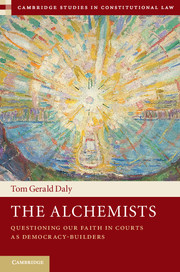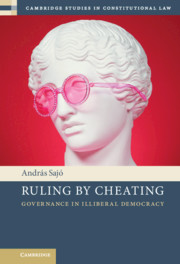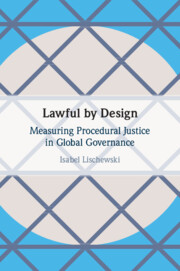The Alchemists
Can courts really build democracy in a state emerging from authoritarian rule? This book presents a searching critique of the contemporary global model of democracy-building for post-authoritarian states, arguing that it places excessive reliance on courts. Since 1945, both constitutional courts and international human rights courts have been increasingly perceived as alchemists, capable of transmuting the base materials of a nascent democracy into the gold of a functioning democratic system. By charting the development of this model, and critically analysing the evidence and claims for courts as democracy-builders, this book argues that the decades-long trend toward ever greater reliance on courts is based as much on faith as fact, and can often be counter-productive. Offering a sustained corrective to unrealistic perceptions of courts as democracy-builders, the book points the way toward a much needed rethinking of democracy-building models and a re-evaluation of how we employ courts in this role.
- Presents the first systematic argument against undue reliance on courts as 'democracy-builders' in post-authoritarian states
- The first book to integrate analysis of constitutional courts and regional human rights courts, and elaborates a novel analytical framework for how courts at each level act and interact as democracy-builders
- Critically assesses the claims and arguments made for the democracy-building capacities of courts at each level and presents clear policy prescriptions for rebalancing excessive reliance on courts
Reviews & endorsements
'This extraordinarily timely work deals with a critical question for democratisation about the weight of the expectations placed on constitutional and human rights courts. The work is global in its focus, soundly based in fact, impeccably researched and convincingly argued. It will be a staple of the democratisation literature for some time to come.' Cheryl Saunders, Laureate Professor Emeritus, Melbourne Law School and Co-convenor of Constitution Transformation Network
'Tom Gerald Daly's The Alchemists is an important contribution to the growing comparative constitutional law of democracy, and takes the literature in exciting new directions. By examining in detail the 'democracy-building' jurisprudence of the Brazilian Supreme Court, and the complex interplay between regional human rights courts and national constitutional courts, especially in Latin America, The Alchemists raises a host of important questions and insights that will spark many scholarly conversations.' Sujit Choudhry, I. Michael Heyman Professor of Law, University of California, Berkeley and Founding Director, Center for Constitutional Transitions
'The Alchemists is an important new book in the field of comparative constitutional studies, which poses a serious challenge to recent arguments in favour of constitutional courts as promoters or defenders of democracy. It highlights the danger, in this context, of high popular expectations of such courts, twinned with low court capacity. It also points to distinct dangers related to courts assuming an ambitious role in democratic transformation, such as via the enforcement of social rights, the danger of obfuscating underperformance in other key areas, distracting from core political struggles, and underplaying the centrality of political rights. In making these arguments it also canvasses a broad and diverse range of jurisdictions. It is essential reading for anyone working or writing in the field of democratisation and comparative constitutionalism.' Rosalind Dixon, Professor of Law, University of New South Wales Faculty of Law
'Comparative constitutionalists, political scientists, and policymakers have recently shown great faith in the work of courts in new democracies. Anchored by a rich case study of Brazil and drawing on a wide range of comparative evidence, The Alchemists is not only an important caution pushing back against this trend, but also provides a thoughtful map of the ways in which domestic and international courts might work towards a more achievable role conception. Scholars of courts and democratization processes will benefit immensely from grappling with Tom Gerald Daly's arguments.' David E. Landau, Mason Ladd Professor & Associate Dean for International Programs, Florida State University College of Law
Product details
January 2018Hardback
9781108417945
390 pages
235 × 158 × 25 mm
0.67kg
6 maps 1 table
Available
Table of Contents
- Preface: our court obsession
- Acknowledgments
- Table of cases
- List of abbreviations
- Introduction: an onerous role for courts as democracy-builders
- 1. The core concept: democratisation
- 2. The rise and limits of constitutional courts as democracy-builders
- 3. The rise and limits of human rights courts as democracy-builders
- 4. 'Democratisation jurisprudence': framing courts' democracy-building roles
- 5. Domestic democratisation jurisprudence in action: Brazil since 1988
- 6. Regional democratisation jurisprudence: shaping democracy from outside
- 7. What should courts do in a young democracy? Rethinking our approach
- Concluding thoughts: moving beyond our court obsession
- Bibliography
- Index.






.jpg)